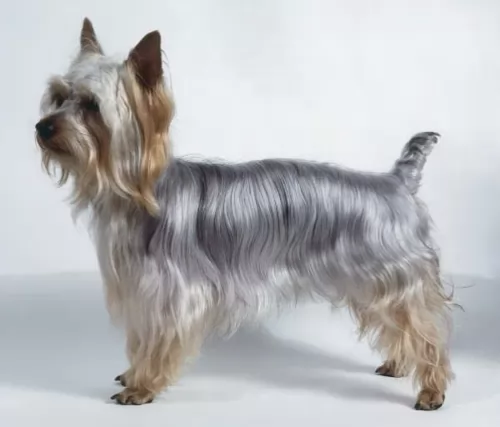 Petzlover
PetzloverSilky Terrier is originated from Australia but Tweed Water Spaniel is originated from United Kingdom. Silky Terrier may grow 34 cm / 13 inches shorter than Tweed Water Spaniel. Silky Terrier may weigh 27 kg / 59 pounds lesser than Tweed Water Spaniel. Both Silky Terrier and Tweed Water Spaniel has almost same life span. Both Silky Terrier and Tweed Water Spaniel has almost same litter size. Both Silky Terrier and Tweed Water Spaniel requires Moderate Maintenance.
 It is the Yorkshire Terrier and the Australian Terrier which are the ancestors of the Australian Silky Terrier. This is by no means a new dog breed. It is believed that the breed came into existence at the end of the 19th century.
It is the Yorkshire Terrier and the Australian Terrier which are the ancestors of the Australian Silky Terrier. This is by no means a new dog breed. It is believed that the breed came into existence at the end of the 19th century.
The dog’s purpose is to be a companion. This little canine wasn’t always known as the Silky Terrier, but in 1955 the name became officially Silky Terrier.
The breed is also recognized by the Australia National Kennel Council in the Toy Group. In fact the breed is recognised by a number of the major kennel clubs as well as the Fédération Cynologique Internationale.
The Tweed Water Spaniel is extinct. Fortunately, we have some beautiful dogs that come from this dog. It is involved in bringing about the Golden Retriever. They were athletic dogs from Berwick-upon-Tweed.
It was in 1816 that Richard Lawrence wrote of the origins of the Tweed Water Spaniel which is thought to have come from the Newfoundland dog. It is believed that huntsmen used these dogs to retrieve the ducks and geese they shot. This purebred dog wasn’t recognized by the American Kennel Club or the FCI.
 This is a small dog breed, standing at just 21 to 26cm in height and weighing in the region of 4 to 5kg. He may be a toy dog, but he is robust and athletic.
This is a small dog breed, standing at just 21 to 26cm in height and weighing in the region of 4 to 5kg. He may be a toy dog, but he is robust and athletic.
The ears of the Silky are small and erect with a lot of silky hair that hangs down and the tail is preferably docked and held high.
His coat is eye-catching – straight, long, silky and shiny. If it is left unclipped, it will reach the floor. The colour of the coat is a tan and silvery grey.
The temperament of any dog is affected by things such as heredity, upbringing and the training and socialization he receives.
Small he may be, but the Silky Terrier can benefit from training as he is feisty and strong willed.
He is energetic and always ready for action. He is ready to come bounding after you and join his human family for any action they’re into. He is playful, bold, loyal, tenacious, independent, social and lively and he makes a good playmate for children.
He might tend to be a bit snappy and aggressive towards other dogs. He is also great as a watchdog, barking and alerting you to strangers.
The Tweed Water Spaniel had a curly liver-colored coat with a long feathery tail and medium-sized floppy ears. It is thought that he was a large dog standing at between 50 to 60cm in height and weighing between 25 and 32kg.
The Tweed Water Spaniel, regarded as a moderate shedder, would have required being brushed from time to time.
The Tweed Water Spaniel had so many wonderful characteristics that made him a splendid family pet. He was smart and able to learn basic commands. He was also very playful and would have made a robust, playful friend for children.
They made gentle, loyal companions for their human family and wee able to get on well with other pets in the home. They would have got on well with other pets in the home too and it is believed that they were amicable enough to have been suited as a therapy dog.
They made good watchdogs too, being active and alert, just loving the outdoors. They’re well suited to life in the country or a home with a big garden and wouldn’t like to be cooped up on a small property in the city.
 The silky terrier is a good choice for those who want a smallish dog but one which is robust and adventurous.
The silky terrier is a good choice for those who want a smallish dog but one which is robust and adventurous.
Your Silky is a loyal dog who loves spending time with his human family, wanting their companionship.
He will need to be physically and mentally stimulated as he is bright and intelligent. He can adapt to life in the city or the countryside but will need to be well exercised wherever he is.
Intelligent, courageous and friendly, it seems such a pity that the Tweed Water Spaniel is extinct because he seemed to have been a super dog.
Luckily we have dogs such as the Golden Retriever that remind us of what a good family pet he was.
 Just like most other dogs, the Silky Terrier isn’t likely to get sick easily, but he can still succumb to any one of the dog illnesses there are.
Just like most other dogs, the Silky Terrier isn’t likely to get sick easily, but he can still succumb to any one of the dog illnesses there are.
This is when your pet isn’t able to regulate blood sugar levels. Your dog will be drinking a lot more water than usual and also be urinating more often. The vet will explain to you a special diet for your pet and how the disease can be controlled with insulin.
This is a disease seen more often in smaller dogs like the Silky. It is caused by an obstruction in the airway and symptoms can include labored breathing and coughing. Your dog will need to be treated with anti-biotics and possibly surgery.
Because this dog is extinct and because no health records were kept, it is assumed that he would have had the same health issues as a Golden Retriever. Typical health issues of this dog would include hip dysplasia, obesity, cardiomyopathy.
This is a preventable disease in dogs, and if dog owners only knew what damage they do by allowing their dogs to become obese. Certainly, obesity shortens a dog’s life.
It is mind-boggling to realize that scientific evidence tells us that fat tissue is biologically active, secreting inflammatory hormones and also putting stress on the dog’s joints. Obese dogs develop an increased risk for cancer, diabetes and heart disease.
Dilated cardiomyopathy is a disease of the heart muscle characterized by an enlarged heart. The heart doesn’t function properly with the ventricles becoming enlarged. The muscle wall of the heart becomes thinner and this causes the heart to lose the ability to pump blood to the rest of the body.
Fluid can accumulate in the lungs. This can all lead to congestive heart failure. Your dog will battle to breathe, be panting and coughing, have an extended abdomen and may even collapse.
 You can imagine that with that silky hair, you’re going to have to be brushing your furry friend quite a bit. It’s such soft, silky hair that it easily picks up burrs and gets matted. You may want to get your pet to a professional groomer to have the hair cut. As you brush him, check for any unusual lumps and keep an eye on his skin.
You can imagine that with that silky hair, you’re going to have to be brushing your furry friend quite a bit. It’s such soft, silky hair that it easily picks up burrs and gets matted. You may want to get your pet to a professional groomer to have the hair cut. As you brush him, check for any unusual lumps and keep an eye on his skin.
Check your pet’s teeth. Bad teeth can cause bacteria that can affect every part of your dog’s body. Check inside his ears for redness and check his eyes that there is no discharge. Trim the nails. If you don’t have the time or the inclination to do all these things for him, make an appointment with the professional pet groomers who will do it for you.
The Silky Terrier will need quality food if you want him to enjoy a long, healthy life. Its always a good idea to have some of the top quality commercially manufactured dog foods with you for convenience. If you want to give him the best there is, some home-made food will be a good choice, if you keep it simple.
Boiled chicken, brown rice or pasta and spinach, sweet potatoes and carrots are a healthy choice for your pet – plain and simple without any exotic spices that could upset his stomach. Your dog will lap it up and you will see how he loves it. Chop the home-made food up and add some of it into his dry kibble as a treat twice a week.
The Tweed Water Spaniel had floppy ears and as a water dog, he may well have had ear infections in his day. One wonders if dog owners of that time were aware of the need to have the inside of the dog's ears clean and dry.
The Tweed Water Spaniel would have needed to have his eyes checked too. Pus in the eyes could indicate the dog wasn’t well.
The Tweed Water Spaniel would have required a lot of exercise and would have loved long walks and hikes. He wouldn’t need an invitation to go swimming and if you threw a stick or ball into the water, he’d be right there, jumping right in.
If you were a person that thrived on an active life this dog would have been for you.
Nobody really knows what the Tweed Water Spaniel would have eaten in the 19th century when he was around. He’s the kind of dog you’d have to be careful with as he could put on weight easily.
If he were around today, you’d give him a high quality commercially manufactured food that was designed for large, active dogs. No doubt in those days, the owners gave the dog scraps off the table.
Today if you wanted to give your dog home-made food, you’d stick to healthy foods such as boiled chicken, brown rice or pasta and some healthy vegetables such as spinach, carrots and sweet potatoes.
Puppies would have required 4 bowls of food a day while the adult dog would require 2 meals a day.